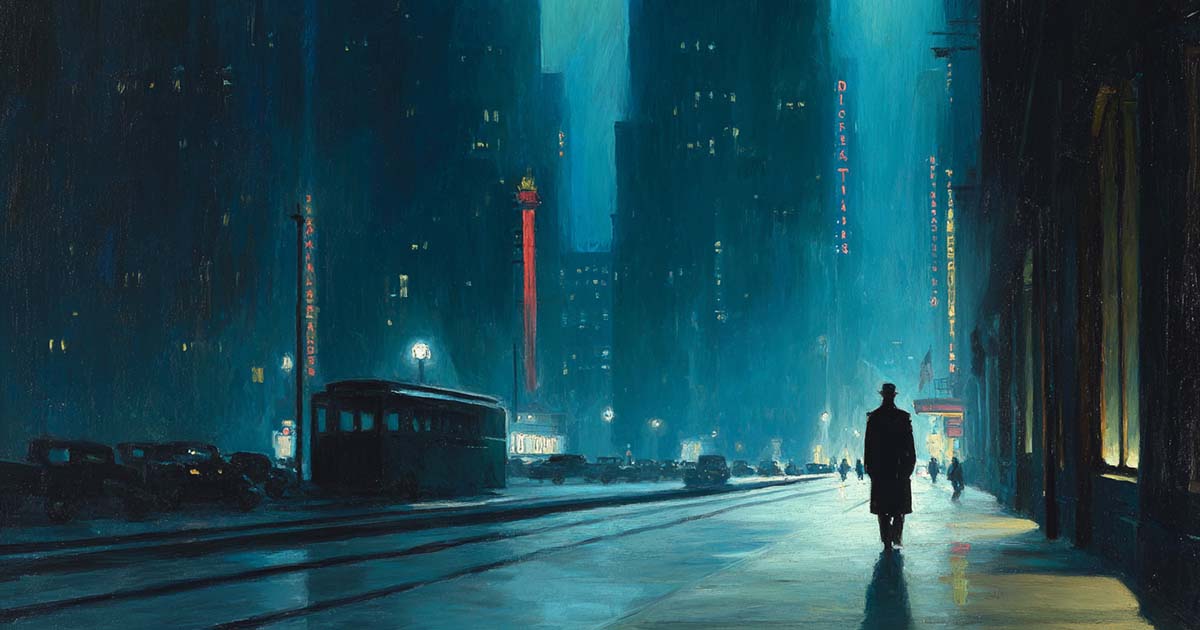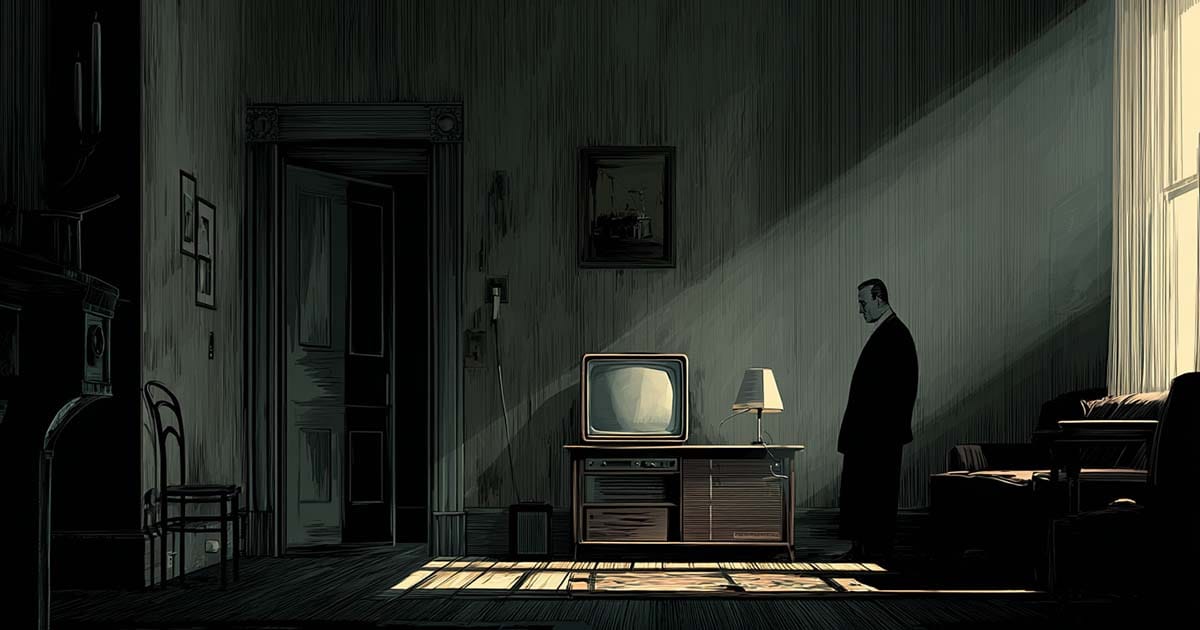Philip K. Dick and the Fear of Disappearing
A haunting review of Philip K. Dick’s “Flow My Tears, the Policeman Said,” exploring identity, memory, and faith in a watchful world where one man’s disappearance reveals the cost of being forgotten.

The Man Who Dreamed in Doubt
Philip K. Dick wrote "Flow My Tears, the Policeman Said" during a decade that questioned every institution. The novel arrived in 1974 when America's faith in government was running thin and technology promised both order and intrusion.
Readers who had grown up with the optimism of the space age now faced an age of suspicion. Dick understood that doubt could be more terrifying than any alien invasion.
He was already known for stories in which reality slipped like sand through the fingers. "Do Androids Dream of Electric Sheep" had asked what it meant to be human, while "Ubik" had asked if time itself could be trusted. "Flow My Tears" turned inward. It studied not the machinery of false worlds but the soul of a man who wakes to find his own name erased.
In this story, Dick seemed less concerned with the spectacular and more with the intimate panic of vanishing from memory. The novel's science fiction setting serves as background to an emotional truth about how identity depends on recognition. It feels both modern and old-fashioned. Modern in its talk of data and records, old-fashioned in its belief that a man's worth is measured by the eyes that remember him.
By the mid-seventies, Dick was writing with unusual clarity. The wild invention of his early novels gave way to a steady, almost sorrowful tone. "Flow My Tears" shows a writer who had seen too much of confusion and wanted to understand it. What he found was not order, but grace in uncertainty.
The Stage of Control Society, Power, and the Vanished Self
The world of "Flow My Tears, the Policeman Said" is a disciplined one. Every citizen carries identification, and those without it face arrest. The government has become a surveillance machine that rewards obedience and punishes even minor acts of independence. It is a cold society that measures worth through documentation.
Philip K. Dick paints this setting without heavy explanation. The reader senses the fear in every routine exchange, the quiet dread of being noticed by authority. What makes this world frightening is not its violence but its efficiency. Every rule appears logical, every system justified, yet all humanity leaks out through the cracks.

There is an echo of Orwell's "1984" in the constant watchfulness. There is also a touch of Bradbury's "Fahrenheit 451" in the sadness of those who remember freedom but cannot name it. Dick's version is more intimate. Instead of open rebellion, he offers erasure. The central horror is not that the state kills its citizens, but that it forgets them completely.
The idea of the vanished man mirrors American anxieties of the 1970s. Technology was moving from promise to threat, and privacy was shrinking. Dick's story speaks to the fear that a clerical act could erase a person, that life itself might depend on a file or card. His future feels bureaucratic rather than barbaric. The danger lies not in tyranny by force but in tyranny by record keeping.
What gives this society its power is not only the state but the citizens who accept it. People cooperate out of habit, grateful for structure. Dick saw how order can become a comfort that dulls conscience. The world of "Flow My Tears" reminds us that when men trade freedom for safety, they risk losing even the memory of who they were.
Characters in the Maze Taverner, Buckman, and the Human Core
Jason Taverner lives at the top of his world. He is famous, admired, and certain of his importance. When that certainty vanishes, the man beneath the celebrity is revealed.
His journey is not about finding who erased him but about discovering what remains when applause stops. Dick gives him the uneasy charm of a man who has always lived under bright lights yet feels the shadows pressing in.

Taverner's crisis becomes a study in dependence. He learns that fame cannot shield him and that identity is not self-made. Each encounter forces him to face the limits of his control. Dick's sympathy for Taverner keeps the story from turning cynical. The character is flawed but recognizably human, caught between pride and the longing to be known.
General Felix Buckman is Taverner's mirror. Where Taverner loses identity, Buckman carries too much of it. He embodies the state's power while hiding his loneliness behind discipline. His authority masks an ache for connection. Through him, Dick gives the novel its moral contrast, showing how even a servant of oppression can feel the weight of conscience.
The relationship between these two men forms the emotional core of the book. Their meetings are marked by unease and mutual recognition. Both understand what it means to be trapped in systems larger than themselves. Dick's restraint in portraying them gives the novel its quiet force. He lets their choices and silences reveal the tragedy of men who see the truth too late.
Compared with earlier Dick heroes, Taverner and Buckman feel grounded. They are not wanderers in cosmic hallucinations but citizens of a recognizable future. This focus gives the novel its depth. It is not a puzzle about alternate realities, but a portrait of ordinary men confronting the emptiness behind certainty. Dick's insight lies in showing that humanity's greatest struggle is not against machines, but against the hollowness within.
Themes of Memory, Faith, and the Fractured Real
"Flow My Tears, the Policeman Said" revolves around the idea that memory defines being. In Dick's world, a man's existence depends on what is recorded about him. When those records vanish, so does his proof of life. The story becomes a meditation on how fragile identity can be when it relies on the systems that surround it. The threat is not death but forgetting.
Memory in the novel is both mechanical and emotional. Computers store data, but hearts store meaning. Dick contrasts the two with care. His characters cling to small tokens of recognition, a name remembered, a moment of mercy, a face that still recalls their own. Through this contrast, he asks what truly sustains a person. The suggestion is that the soul endures not because of documentation but because of love.
There is also a quiet sense of faith beneath the surface. Dick's worlds often feel abandoned by God, yet they still yearn for the divine. "Flow My Tears" carries this yearning more gently than his earlier, harsher works. The unseen order that moves events may be fate, madness, or grace. Dick leaves it unresolved, trusting the reader to sense that even in chaos something merciful stirs.
The title deepens the mood. Drawn from John Dowland's song "Flow My Tears," it brings the sadness of an older age into a modern nightmare. The music's sorrow echoes in every scene. It reminds the reader that grief can be noble when it leads to understanding. The novel's tone is mournful but never hopeless.
Compared with the fever of "A Scanner Darkly," this story feels composed, almost prayerful. Dick seems to have traded his earlier frantic questioning for reflection. The world remains uncertain, but he treats it with tenderness. Beneath the surveillance and the loss there runs a quiet belief that man is more than his circumstances.
In the end, "Flow My Tears, the Policeman Said" becomes less a warning than a lament. It mourns the disappearance of trust, of faith, of the human face in a mechanical age. Yet even in its sorrow, there is a hint of redemption. Dick suggests that to remember one another is to resist the void. Memory, faith, and love form the last defenses of the real.

Legacy and Final Judgment The Quiet Light Behind the Darkness
When "Flow My Tears, the Policeman Said" reached readers in the 1970s, critics were divided. Some called it one of Philip K. Dick's most coherent works. Others felt its explanation weakened the mystery it had so carefully built. Yet even those who doubted its structure agreed that it carried emotional weight beyond most science fiction of its time. It won the John W. Campbell Memorial Award and secured Dick's place as more than a writer of strange futures. He had become a writer of moral visions.
The novel's endurance lies in its honesty. It speaks to the fear of vanishing into the background noise of modern life. That fear has only grown with technology's reach. Dick's imagined world of identification systems and state control feels less distant now. Readers recognize themselves in Taverner's confusion and in Buckman's search for meaning within authority. The story holds a mirror to any age that forgets the worth of the individual.
What separates this book from the mechanical dystopias that followed is its compassion. Dick never lets despair have the final word. He knew that machinery could fail, but that conscience could survive. His future is frightening, yet it is also a place where a single act of mercy can still shine. That belief gives the book its staying power.
In its quiet way, "Flow My Tears, the Policeman Said" reminds the reader that even in a world built on documentation, the soul cannot be filed away. The characters' small awakenings suggest that identity is not granted by systems but revealed by love and memory. Dick's vision, dark as it seems, leaves a light burning at the end. It is the light of recognition, the one that tells us we are seen, and therefore still alive.

